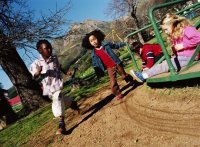Teach Social-Emotional Learning for Better Schools, Safer Neighborhoods
Your content has been saved!
Go to My Saved Content.When I was introduced to the term "social-emotional learning" and began to understand its meaning, I recognized it as a ray of hope. Hope for my community, which, seemingly unbeknownst to me, had changed dramatically over the years.
The only visible signs of change were the front lawns in the neighborhood, now less well-kept than in the past. Drive through the neighborhood today and you will see men standing on the corner of my block, where they have stood for years. But what you will not see is the blood that has been shed on that same corner, of men and women, young people to old. Yet the men continue to stand on that corner, where some of their own friends have lost their lives over the years.
Waking Up and Making a Difference
I started searching for answers to these killings in 2008 when my neighbor's son died on that very corner. My search led me to discover the concept of social-emotional learning, and I am eternally grateful. I believe with all of my being that it gives hope to my community and can help stem the tide of violence in my neighborhood and others.
When my neighbor knocked on my door that fateful morning to let me know that her son had been killed, gunned down one block from our homes, it is hard to explain the depth of my feelings. When I could finally breathe, what I did was evaluate myself and how I may have contributed to the senseless killing. I realized that not only didn't I know my neighbor’s son, but that I really didn't know her or the other eight children she was raising as a single mother.
Yes, I had spoken to her and her children in passing, but that was on the surface. Why hadn't I gotten to know them beneath the surface? I had been too busy with my own family, work, friends, etc., to get to know my neighbors. How did my block become a killing field -- nicknamed "Beirut," I later learned -- and how do we work to stop it? How did we get here?
In a sense, I had been asleep.
Now that I was awake, I had to decide what to do next. All this personal reflection was taking place around the same time our new president, Barack Obama, was elected. On January 19, 2009, he asked all of us to volunteer for a day. So I decided to look for an agency or organization where my family could spend the day volunteering, in my community or somewhere on the Southeast Side of Chicago.
When I checked the website the president's group had published, not one Southeast Side organization was listed. I cried, because it seemed nobody cared about the children in my neighborhood. I called up my local park district and asked if I could volunteer. I started going to meetings.
We Are the Change We Seek
Fast-forward to the fall of 2012, when I was introduced to the concept of social-emotional learning and, for the first time, I could see the light at the end of the tunnel. The Collaborative for Academic, Social and Emotional Learning (CASEL) defines the concept as a process through which children and adults learn how to effectively:
- Apply the knowledge, attitudes and skills necessary to manage emotions
- Set and achieve positive goals
- Feel and show empathy for others
- Establish and maintain positive relationships
- Make responsible decisions
In an ideal world, social-emotional learning would be a part of every school curriculum in the nation.
In the quest to stop the killings in our community, my neighbors and I started a movement to have social-emotional learning whole-heartedly implemented in our local schools. In our research, we found that no elementary school in our area teaches social-emotional skills in any measurable way.
We believe that if children are taught sound decision-making, relationship-building, conflict management and other valuable life skills from pre-school through 12th grade, more of them will choose to go to college or enter the workforce instead of joining gangs and participating in negative activity that will only land them in jail before they begin their lives.
Like President Obama has said, "Change will not come if we wait for some other person or if we wait for some other time. We are the ones we've been waiting for. We are the change we seek."
When I woke up, I realized that I had to actively participate in leading my community out of Beirut.
